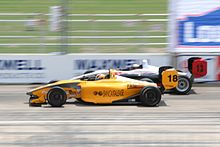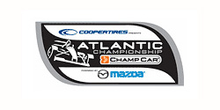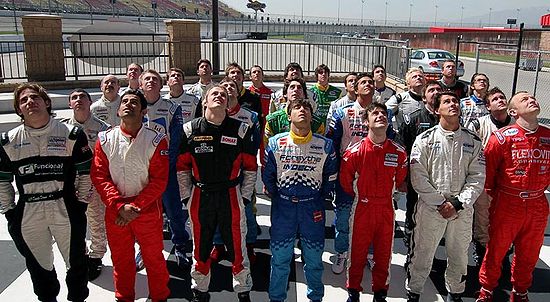- Atlantic Championship
-
Atlantic Championship 
Category Open wheeled Country or region  United States
United States
 Canada
CanadaInaugural season 1974 Folded 2010 Drivers 24 Teams 12 Constructors Swift Engineering Engine suppliers Mazda-Cosworth Last Drivers' champion  John Edwards
John EdwardsLast Teams' champion  Newman Wachs Racing
Newman Wachs RacingOfficial website atlantic-championship.com The Cooper Tires presents the Atlantic Championship Powered by Mazda was a formula race car series with races throughout North America. It is often colloquially referred to as the Atlantic Championship, Champ Car Atlantics (after its former name), Toyota Atlantics (due to the series' previous history of using Toyota-powered engines), or just Atlantics or Formula Atlantic, although the latter two terms risk confusion with the Sports Car Club of America's amateur Formula Atlantics division. The series used to be sanctioned by the Champ Car World Series before that series ceased operations in 2008, with most of its races being support races for the Champ Car World Series. Sanctioning by IMSA was announced June 23, 2008.
As of March 3, 2010, the series is on hiatus, with its president citing difficult global economic conditions.[1]
Contents
Series information
The Atlantics series is a developmental open-wheel racing series in North America, also called a "ladder series." In 2005, a new factor was announced to solidify this reputation as the last series in which a driver will compete before moving to Champ Car, or the highest levels of sports car racing such as American Le Mans. A US$2 million prize was announced for the winner of the 2006 racing season and future seasons, with the restriction that it can only be used towards the cost of racing in the Champ Car World Series.[2] Simon Pagenaud became champion in 2006 and claimed the first such prize, and he promptly moved to Champ Car in 2007 to race for Walker Racing.
The series champion for 2007, Raphael Matos, also won the $2 million prize towards a Champ Car ride. However, he elected not to accept it as he felt that without other sponsorship, he would be driving for a non-competitive team.[3] Matos instead accepted an offer from the Andretti Green Racing team in the developmental Firestone Indy Lights Series instead, where he was promised the chance to race in the Indy 500 and a future ride in the IndyCar Series.[4] 2007 runner-up, Franck Perera, who finished on the podium eight times during the season and won three races ultimately signed to race with Champ Car team Conquest Racing. When Champ Car was purchased by IndyCar prior to the 2008 season, Conquest joined IndyCar with Perera.
As of 2009, the series offers an unrestricted $1,000,000 prize to the season champion, $500,000 to the runner-up, and $250,000 to the third place finisher on the season. These season rewards are part of total of $3,000,000 in total prize money, which also features $50,000 for each race win, and other bonuses such as a monetary pole position reward.[5]
 Giacomo Ricci (foreground) passing Frankie Muniz in their Swift 016.a machines during the 2007 Houston race.
Giacomo Ricci (foreground) passing Frankie Muniz in their Swift 016.a machines during the 2007 Houston race.
Race equipment
Starting in 2006, the series has been run exclusively with Swift 016.a chassis powered by Mazda-Cosworth MZR 2300 cm³ (2.3 L) DOHC inline-4 engines producing 300 bhp (224 kW). The cars are capable of speeds in excess of 175 mph (280 km/h).[6] The new formula has lowered the costs of running a full Atlantic season to around $500,000–$600,000. This reduction in costs, plus the addition of the aforementioned $2 million prize, had an immediate effect on increasing the number of competitors in the series (car count), which had dwindled over the previous few seasons. For example, the 2007 season featured 30 drivers.[7]
Although the series had been run on Yokohama tires since 1991, the Japanese company elected to end its relationship with the series after the 2006 series, at which point it was replaced by Cooper Tire who are also the current title sponsor for the series.
Specifications
- Chassis: Swift 016.a, Carbon-fibre composite with kevlar, two roll-over structures. No change of chassis during an event.
- Engine Displacement: Cosworth Built Mazda 2.3 L (140 in³) MZR DOHC I-4.
- Gearbox: Swift 5 Speed Sequential Manual Transmission (must have reverse).
- Power Output: 280 hp (209 kW; 284 PS) @ 6500 rpm.
- Fuel: VP Racing Fuels 108 RON Leaded gasoline, no refueling (similar to Formula 3, GP2 Series, GP3 Series, Formula 1 and Formula Renaults).
- Fuel Tank: IMSA homologated rubber safety tank.
- Fuel Delivery: Fuel injection.
- Aspiration: Naturally aspirated.
- Electronics/ECU: Cosworth Electronics Data: Pi Research Sigma/ECU - Pectel SQ6/Wiring - Performance Wiring Solutions wiring.
- Length: 4,498 mm (177.1 in).
- Width: 1,956 mm (77 in).
- Wheelbase: 2,776 mm (109.3 in).
- Weight: 643 kg (1,418 lb), with driver.
- Steering: Manual, rack and pinion.
- Drivetrain: 2WD only.
- Brakes: Performance Friction Brakes.
- Tires: Cooper Atlantic Championship racing slicks and rain tires.
- Wheel rims: BBS.
- Safety equipment: HANS device, Seat belt 6-point supplied by Sabelt.
- Prohibitings: Active suspension, telemetry and traction control.
History
The history of Formula Atlantic begins with the SCCA Formula B class, created in 1965 for single-seat formula cars with engines not exceeding 1600 cm³ in capacity. Prior to Formula Atlantic, professional Formula B races were held in the United States from 1965 to 1972, firstly with the SCCA's poorly-supported Formula A, then as part of the SCCA Formula Continental Championship in 1968 (when they were largely overshadowed by the V8-powered Formula 5000 cars) and then as an independent series from 1969 to 1972.
Formula Atlantic as a class evolved in the United Kingdom in 1971 from the US Formula B rules, with 1600 cm³ production-based twin-cam engines (initially Lotus-Ford twin-cams but then Cosworth BDA and BDD, however other engines like Alfa Romeo were also eligible). Conceived by John Webb of Brands Hatch (who would later also develop the Sports 2000 class) as a category for national competitors with the performance near a Formula Two car but running costs at or below that of a contemporary Formula Three car. A single (Yellow Pages championship ran in 1971–72, with a rival BP backed series appearing in 1973. 1974 saw the BP series changing sponsor to John Player, and the Yellow Pages series becoming backed by John Webb's MCD organisation and Southern Organs; in practice most top drivers competed in both series and there were no date clashes. Only one series ran in 1975-76, in the final year taking the title 'Indylantic and adopting Indianapolis-style single-car qualifying. But the formula was under threat from Formula 3 and no series ran in 1977–78. The series returned in 1979 with backing (for one season only) from Hitachi and continued to 1983, with diminishing grids and few new cars appearing.
As a result of its similarity to Formula 2 and Formula 3 in terms of chassis regulations, Formula Atlantic typically used chassis closely related to these cars—with performance somewhere in between the two—so most of the manufacturers were familiar from those classes, particularly the likes of Brabham, Lotus, March, Chevron early on, with Ralt and then Reynard later. US manufacturer Swift came to displace the British imports and dominate in North America. Several smaller marques also appeared.
The first professional races run under Formula Atlantic rules in North America were conducted in 1974 by the Canadian Automobile Sport Clubs (CASC) in Canada (now ASN Canada), drawing much attention and large fields due to its national CTV television coverage. IMSA in the United States took advantage of the large number of teams and organized their own series in 1976.
During these years, the series attracted guest drivers from Europe, including Formula One, particularly at the Trois-Rivières street race in Quebec, Canada. Guest drivers included James Hunt, Jean-Pierre Jarier, Riccardo Patrese, Patrick Depailler, Jacques Laffite, Didier Pironi and Vittorio Brambilla.
In 1977, the SCCA sanctioned the US events and in 1978 the CASC and SCCA series merged, and conducted the series jointly until 1983, when it ran as the Formula Mondial North American Cup; Michael Andretti won the championship. The series could not sustain the success of earlier seasons and was cancelled for 1984.
In its place a "Pacific" series was conducted exclusively on the US West Coast in 1985. This rebirth expanded to an East Coast "Atlantic" series the following year and the two ran concurrently through 1990. From 1990 to 2005, the series was sponsored by Toyota and the cars were powered by 1600 cc Toyota 4A-GE engines available in kit form from Toyota Racing Development. With the support of Toyota, the two US series were reunited into a single North American championship and have remained so to this date.
The same rules were adopted as Formula Pacific (not to be confused with the US Formula Atlantic Pacific Championship) and races were run in Australia, and New Zealand, where Formula Pacific became the top class of racing. For a few years the prestigious Macau Grand Prix was run to Formula Pacific rules before becoming a Formula Three race. South Africa also adopted Formula Atlantic rules, but later mandated that the cars were fitted with Mazda Wankel engines.
In recognition of the global acceptance of the formula it was briefly renamed Formula Mondial in 1983, but its peak of international popularity was some years past.
Former drivers in the series include legends such as Gilles Villeneuve, Jacques Villeneuve, Bobby Rahal and Michael Andretti, and many current and former IRL and Champ Car drivers including Jimmy Vasser, Paul Tracy, Calvin Fish, A. J. Allmendinger, Ryan Hunter-Reay, Scott Harrington, Robbie Buhl, Andrew Ranger, Ronnie Bremer, Danica Patrick, Alex Tagliani, Patrick Carpentier, Buddy Rice, Dan Wheldon, Sam Hornish, Jr., Raphael Matos, Roger Yasukawa, and Simona De Silvestro.
The latest in a long line of television celebrities to enter this series—starting with Dick Smothers at the very first race in 1968[8]—was Frankie Muniz of the Fox Network comedy "Malcolm in the Middle", making his debut in 2007. Sharing the dream of many American open wheel racers, Muniz stated his intention to use Champ Car Atlantics as a direct path to racing in the Champ Car World Series.[9]
Women in the Atlantic Championship
A few women have chosen to participate in Atlantic racing under the Toyota Atlantic or Atlantic Championship powered by Mazda banner.
As mentioned in the list of former drivers, Danica Patrick was an Atlantic competitor in 2003 and 2004. She was the first woman to score a pole position in the series, and the first woman to finish on the podium. She also led the 2004 season briefly before finishing third overall in season results, but did not notch a win in two years of Atlantic competition.
Katherine Legge also competed in Atlantic for a season. In 2005, she became the first woman in history to win a professional open wheel race in North America, at Long Beach, CA. She then amassed two more wins in the same season, and finished third overall in season results.
Simona De Silvestro was an Atlantic Championship contender who led a large portion 2009 Atlantic Championship season, ultimately finishing third. In three years in the series, she has bettered Katherine Legge's career mark of three wins, with one in 2008 and four in 2009.
Series ownership and sponsor commitments
On October 31, 2008, an official announcement was made that the Atlantic Championship series had been purchased by Ben Johnston, an Atlanta area businessman and one-time Atlantic racer.[10] At the same time, Mazda and Cooper Tires also announced a continuing commitment to the series.[11] Then, in 2009, Mazda recommitted its support to the Atlantic Championship by extending an engine contract that covers the series through the year 2011.[12]
Television and other video
Atlantic Championship races have previously been shown on multiple networks, including SPEED. For 2009, a new high definition television package was announced on HDNet, which features live coverage of certain events, and replays of others.[13]
Web video of events has also historically been available on the series website, and the series also has its own official YouTube channel under the username "AtlanticRacingSeries."
Current status of series
In early 2010, Atlantic Championship personnel publicized several features intended to attract new drivers and retain existing racers and teams. One was to brand the series as the "Road to F1," announcing that "at least one current European F1 team manager" would be in attendance to monitor a test for interested racers.[14] Another was to announce prize money that would be paid directly to drivers, rather than to teams.[15] Another press release listed teams that were committed to the series.[16]
Despite these efforts, on March 3, 2010, series officials announced that the 2010 season had been put on hold.[17] Robert Davis of Mazda North American Operations said, "all of us at Mazda are disappointed that the Atlantic Championship will be on hiatus this year." Series president Ben Johnston stated: "the Atlantic Championship office will be working during the down time in order to deliver an unparalleled racing offering when economic conditions allow."
Champions
Season Champion Team Champion Formula Atlantic 1974  Bill Brack
Bill Brack
1975  Bill Brack
Bill Brack Scott Racing
Scott Racing1976 CASC  Gilles Villeneuve (CASC)
Gilles Villeneuve (CASC) Ecurie Canada
Ecurie Canada1976 IMSA  Gilles Villeneuve (IMSA)
Gilles Villeneuve (IMSA) Ecurie Canada
Ecurie Canada1977  Gilles Villeneuve
Gilles Villeneuve Ecurie Canada
Ecurie Canada1978  Howdy Holmes
Howdy Holmes Shierson Racing
Shierson Racing1979  Tom Gloy
Tom Gloy
1980  Jacques Villeneuve
Jacques Villeneuve
1981  Jacques Villeneuve
Jacques Villeneuve
1982  Dave McMillan
Dave McMillan
1983  Michael Andretti
Michael Andretti Conte Racing
Conte Racing1984  Dan Marvin
Dan Marvin
1985 East  Michael Angus (Atlantic)
Michael Angus (Atlantic)
1985 West  Jeff Wood (Pacific)
Jeff Wood (Pacific)
1986 East  Scott Goodyear (Atlantic)
Scott Goodyear (Atlantic)
1986 West  Ted Prappas (Pacific)
Ted Prappas (Pacific)
1987 East  Calvin Fish (Atlantic)
Calvin Fish (Atlantic)
1987 West  Johnny O'Connell (Pacific)
Johnny O'Connell (Pacific)
1988 East  Steve Shelton (Atlantic)
Steve Shelton (Atlantic)
1988 West  Dean Hall (Pacific)
Dean Hall (Pacific)
Toyota Atlantic Championship 1989 East  Jocko Cunningham (Atlantic)
Jocko Cunningham (Atlantic)
1989 West  Hiro Matsushita (Pacific)
Hiro Matsushita (Pacific)
1990 East  Brian Till (Atlantic)
Brian Till (Atlantic)
1990 West  Mark Dismore (Pacific)
Mark Dismore (Pacific)
1991  Jovy Marcelo
Jovy Marcelo Marcelo Group
Marcelo Group1992  Chris Smith
Chris Smith
1993  David Empringham
David Empringham Canaska Racing
Canaska Racing1994  David Empringham
David Empringham
1995  Richie Hearn
Richie Hearn
1996  Patrick Carpentier
Patrick Carpentier Lynx Racing
Lynx Racing1997  Alex Barron
Alex Barron Lynx Racing
Lynx Racing1998  Lee Bentham
Lee Bentham Forsythe Racing
Forsythe Racing1999  Anthony Lazzaro
Anthony Lazzaro PPI Motorsports
PPI Motorsports2000  Buddy Rice
Buddy Rice PPI Motorsports
PPI Motorsports2001  Hoover Orsi
Hoover Orsi P-1 Racing
P-1 Racing2002  Jon Fogarty
Jon Fogarty Dorricott Racing
Dorricott Racing2003  A. J. Allmendinger
A. J. Allmendinger RuSPORT
RuSPORT2004  Jon Fogarty
Jon Fogarty Sierra Sierra Racing
Sierra Sierra Racing2005  Charles Zwolsman
Charles Zwolsman Polestar Racing Group
Polestar Racing GroupChamp Car Atlantic 2006  Simon Pagenaud
Simon Pagenaud Team Australia
Team Australia2007  Raphael Matos
Raphael Matos Sierra Sierra Enterprises
Sierra Sierra EnterprisesAtlantic Championship 2008  Markus Niemelä
Markus Niemelä Brooks Associates Racing
Brooks Associates Racing2009  John Edwards
John Edwards Newman Wachs Racing
Newman Wachs Racing2010 not held References
- ^ http://www.atlantic-championship.com/index.php?option=com_content&view=article&id=129:2010-atlantic-championship-season-placed-on-hold&catid=1:series-news&Itemid=1
- ^ Champ Car > News Friday, September 16, 2005
- ^ Indycar: Matos may race 500., motorsport news, results, features, teams, drivers, updates
- ^ Looking forward :: Indy Racing League Indy Pro Series
- ^ http://www.motorsport.com/news/article.asp?ID=318038&FS=atlantic
- ^ Champ Car Atlantic News
- ^ Champ Car Atlantic Drivers
- ^ OldRacingCars.com | US Formula 5000 | Continental Divide 26 May 1968
- ^ Frankie Muniz Racing - April 2007
- ^ http://www.crash.net/motorsport/indycar/news/171247-0/content.html
- ^ http://www.f1sa.com/index.php?option=com_content&task=view&id=8387&Itemid=219
- ^ http://www.whowon.com/sResults.asp?SanctionID=1289&StoryID=270251
- ^ http://www.theautochannel.com/news/2009/06/05/464552.html
- ^ http://www.atlantic-championship.com/index.php?option=com_content&view=article&id=124:atlantic-championship-series-announces-more-for-less-on-the-road-to-f1&catid=1:series-news&Itemid=1
- ^ http://www.atlantic-championship.com/index.php?option=com_content&view=article&id=126:atlantic-championship-series-announces-2010-prize-fund-for-drivers-&catid=1:series-news&Itemid=1
- ^ http://www.atlantic-championship.com/index.php?option=com_content&view=article&id=127:atlantic-grid-for-sebring-season-opener-filling-up-fast&catid=1:series-news&Itemid=1
- ^ http://www.racer.com/atlantic-championship-on-hold-for-2010/article/165031/
External links
- Official Atlantic Championship Website
- Atlantic Championship history on OldRacingCars.com
- 2008 Atlantic Championship Schedule
Formula Atlantic / Champ Car Atlantic / Atlantic Championship 1974 • 1975 • 1976 IMSA / CASC • 1977 • 1978 • 1979 • 1980 • 1981 • 1982 • 1983 • 1984 • 1985 West / East • 1986 West / East • 1987 West / East • 1988 West / East • 1989 West / East
1990 West / East • 1991 • 1992 • 1993 • 1994 • 1995 • 1996 • 1997 • 1998 • 1999 • 2000 • 2001 • 2002 • 2003 • 2004 • 2005 • 2006 • 2007 • 2008 • 2009 •2010Categories:- Formula Atlantic
- International Motor Sports Association
- Auto racing series in the United States
Wikimedia Foundation. 2010.



